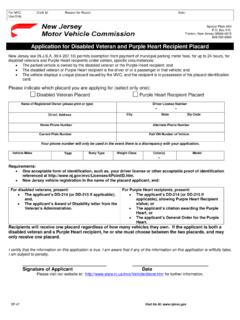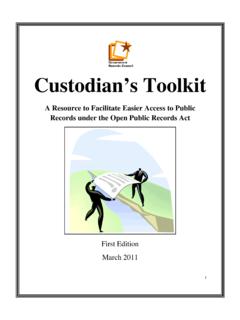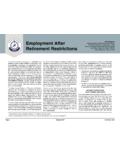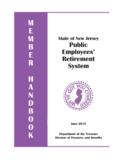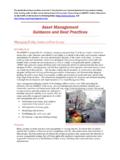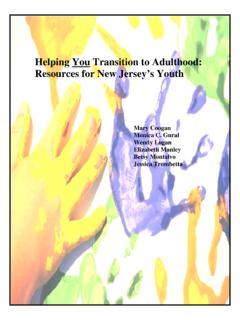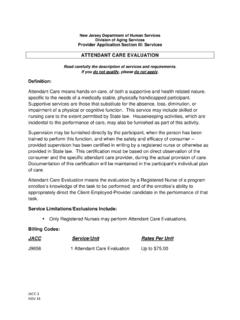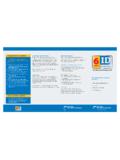Transcription of NJ FamilyCare Aged, Blind, Disabled Programs
1 NJ FamilyCare aged , blind , Disabled Programs2021 STATE OF NEW JERSEY Department of Human Services Division of Medical Assistance and Health Services The NJ FamilyCare aged , blind , Disabled (ABD) Programs provides medical coverage to individuals who are age 65 years or older as well as individuals determined blind or Disabled by the Social Security Administration or by the State of NJ. It is designed for people whose income and resources are not enough to meet the cost of necessary care and services. The individual must be a resident of New Jersey and a citizen of the United States or Qualified Immigrant.
2 An adult must have Legal Permanent Residence status for at least five years. Income and other countable resources are used to determine eligibility. Countable resources are found inside this brochure under What You Own on Page 7. Covered Benefits Comprehensive and quality services include, but are not limited to: Dental Eyeglasses Doctor Visits Specialist Visits Hospitalization Prescriptions Lab tests and X-rays Rehabilitative Care Mental Health Substance Use Long Term Services and Supports (see Page 5) Services provided by:2 Another option for individuals in need of Long Term Services and Supports in the community, is the Program of All-Inclusive Care for the Elderly (PACE).
3 PACE is only available in certain counties. For more information on the PACE Program, call Security Income (SSI) The Supplemental Security Income (SSI) program, administered by the Social Security Administration, is a federal program that provides monthly payments to eligible individuals who are 65 years of age or older and persons determined blind or Disabled by the Social Security Administration. In New Jersey, individuals that are determined to be eligible for SSI automatically receive full NJ FamilyCare ABD Program benefits.
4 An individual may be eligible for SSI in New Jersey in 2021 if his/her gross monthly income is equal to or less than $ or $ for a couple (the first $20 per month of income is excluded). The current resource maximum for an individual is $2,000 and $3,000 for a couple. For more information about SSI, or to apply for SSI benefits, please contact the Social Security Administration at 1-800-772-1213. Medicaid Only The Medicaid Only Program is an aged , blind , Disabled Program for individuals who do not receive SSI but have income and resources under the SSI standards listed above.
5 New Jersey Special Medicaid Programs The New Jersey Special Medicaid Programs are for individuals with gross monthly income that is equal to or less than 100% of the Federal Poverty Level which is $1,074 per month for a single person and a resource maximum of $4,000; $1,452 per month for a couple and a resource maximum of $6,000 in 2021. NJ FamilyCare aged , blind , Disabled Programs4NJ WorkAbility The NJ WorkAbility Program offers full health coverage to people ages 16-64 with disabilities who are working, to obtain coverage when their gross monthly Social Security Disability Income would otherwise disqualify them from other Programs .
6 Eligibility Criteria Age 16-64 Working full or part-time with proof of employment Determined as Disabled by the Social Security Administration OR the Disability Review Team at the Division of Medical Assistance & Health Services Income and asset eligibility as described below Total Earned Income Potential Includes but is not limited to: wages, self-employment earnings, workers compensation, paid sick leave, private or state temporary disability plan benefits or commissions. If you have no unearned income: - Individual gross earned income may not exceed $65,196 per year/ $5,433 per month.
7 - An eligible couple s gross earned income may not exceed $87,900 per year/$7,325 per month. If you have unearned income (for example, in addition to your wages you also receive alimony), the maximum earned income threshold will vary. Unearned Income Threshold Includes but is not limited to: alimony, Social Security Survivors Benefits through a parent or spouse s work history, unemployment, interest, investments, or trust payments. An individual s unearned income may not exceed $1,074 per month. An eligible couple s unearned income may not exceed $1,452 per month.
8 Asset Threshold: Assets do not include primary home, a car used for work or medical transportation, or 401K/IRA retirement accounts. $20,000 for an eligible individual $30,000 for an eligible couple 5 Long Term Services and Supports (LTSS) LTSS are additional services and supports for people who are determined clinically eligible. Clinical eligibility means that they require assistance with three or more activities of daily living, such as mobility assistance, dressing, bathing, eating and other self-care. These individuals may need nursing home placement or choose to live in their community, such as an assisted living type setting or in their home.
9 LTSS can help people remain in their homes and communities by providing extra services such as, but not limited to, personal care, home-delivered meals, and care management. To qualify for LTSS, an applicant must be both clinically and financially eligible. The local County Welfare Agency will do the financial evaluation using information provided in the aged , blind , Disabled Application while the Division of Aging Services is responsible for the clinical eligibility determination for LTSS. The two evaluations are completed concurrently and are coordinated between both agencies.
10 An individual determined clinically eligible by the Division of Aging Services qualifies at a higher income limit of $2,382 per month for a single person with a resource maximum of $2,000 in 2021. In determining financial eligibility, if the gross monthly income exceeds the income limit allowed, he or she can establish and fund a Qualified Income Trust (QIT) with the excess income that is above the limit. More information about a QIT is found on Page 9 under Qualified Income Trust. The financial eligibility process also includes a five year look- back of the applicant s financial accounts and resources to determine if there have been any assets transferred for less than fair market value.
